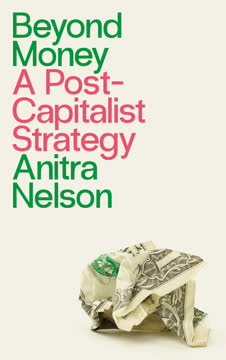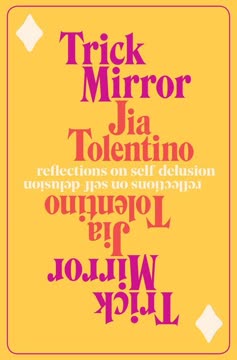Key Takeaways
1. Money is Capitalism's Core Problem, Driving Inequality and Unsustainability.
Money as we know it is capitalism’s sine qua non, its essence.
Systemic generator. Money is not merely a neutral tool but the fundamental engine of capitalism, intrinsically linked to its defining characteristics: profit, competition, and growth. This pervasive influence means that money actively constructs our daily relations, forcing us into a cycle of working for money to acquire basic needs, often from unknown producers under unknown conditions. This system inherently generates and perpetuates inequality, creating a stark divide between winners and losers.
The 1% and 99%. The global capitalist system has led to unprecedented wealth concentration, with the top 1% owning roughly half of total global wealth, mirroring the extreme disparities of the early 20th century. This inequality is not an accidental byproduct but a direct outcome of monetary practices that compare, contrast, and divide. The vast majority, the "99%," experience varying degrees of marginalization, precarity, and poverty, with billions suffering from absolute poverty and undernourishment, despite widespread claims of declining global poverty.
Beyond a symptom. The environmental crises, particularly climate change, are not isolated problems but symptoms of capitalism's inherent drive for infinite growth, fueled by money. The ecological footprint of human activities far exceeds Earth's regenerative capacity, with the wealthiest 10% responsible for half of global carbon emissions. Attempts to address these crises without confronting money's central role are akin to treating a fever without addressing the underlying infection, leading to superficial and ineffective solutions.
2. The Illusion of "Equal Exchange" Masks Money's Role in Systemic Injustice.
What makes these purchases ‘equal’? Nothing but their selfsame price, their forced comparison via ever so many market-based transactions using a claim, itself a variable and unreliable ‘measure’, a standard reflecting the very things it is capable of purchasing at any particular time and place.
False equivalence. The notion of "equal exchange" in monetary transactions is a fundamental fallacy. When we exchange money for goods or services, the only "equality" is the price itself, a transient and unreliable measure that masks the vast inequalities in labor, resources, and power involved in production. This forced comparison through money reduces complex social and ecological values to a singular, abstract metric, distorting our perception of true worth.
Money as a claim. Money functions as a social claim on future marketed goods and services, its value contingent on the continuous operation and expansion of the market. This abstract nature allows it to appear as a solid store of value, yet it is inherently unstable, fluctuating with market conditions. This "claim theory" of money reveals it as a social construct, not a natural tool, whose omnipotence in capitalist societies makes questioning its legitimacy akin to questioning a secular god.
Antagonistic relations. Money's role as the "universal equivalent" fosters competition, efficiency (measured monetarily), and profit, creating antagonistic relations between individuals, firms, and nations. This system, built on private property and the pursuit of monetary gain, inherently generates social problems like inequality and environmental degradation. The idea that money can be reformed to serve progressive ends ignores its fundamental nature as a driver of these very issues.
3. Capitalism's Growth Imperative is Fatal, Clashing with Planetary Limits.
Capitalism has no operating processes to either stabilise or reduce production: the compulsion to reproduce beyond itself is a systemic necessity.
Profit's relentless pursuit. The core imperative of capitalism is profit-making, which translates into a systemic demand for continuous economic growth. Individual capitalists are compelled to minimize costs and maximize sales to remain competitive and avoid bankruptcy, leading to an incessant drive to expand markets and production. This M→Mʹ→Mʹʹ dynamic is not optional but mandatory for the system's survival, making it inherently unsustainable.
Ecological collision. This relentless growth imperative directly collides with the finite resources and regenerative limits of Earth. While pro-capitalist ideologies tout growth as a strength, it is, in fact, capitalism's critical weakness in the face of ecological collapse. The system cannot stabilize or reduce production to meet human and planetary needs because its very existence depends on perpetual expansion, leading to overconsumption, waste, and environmental destruction.
False solutions. Many proposed reforms, even from socialist perspectives, still include modified forms of money and markets, assuming they can be controlled or "tweaked" for progressive ends. However, as long as money and markets exist, the profit imperative and the drive for growth will persist, undermining efforts to achieve genuine social justice and ecological sustainability. True postcapitalism requires abandoning this growth compulsion entirely.
4. "Real Values" Define a Money-Free Postcapitalist World of Collective Sufficiency.
Instead of the old unreal, abstract ‘exchange value’ and ‘money’, in Yenomon we perceive and approach the world using ‘real values’.
A new paradigm. Yenomon, a money-free postcapitalist vision, operates on "real values"—a holistic understanding of environmental and social qualities and quantities that encompass the needs of both people and the planet. This paradigm moves beyond the reductive nature of monetary "exchange value" to embrace the multifaceted worth of living things, landscapes, and human well-being.
Commoning and ecotats. In Yenomon, private property is abolished, and resources are held in common, governed by principles of "commoning." Human settlements are organized into "ecotats"—ecologically rational habitats designed for collective sufficiency, where communities meet their needs within the carrying capacity of their local environment. This involves intricate knowledge of the land, shared skills, and regenerative practices like permaculture and agroecology.
Creation-on-demand. Production and distribution are based on "creation-on-demand," where communities collectively assess and plan to meet diverse individual and collective needs. This process involves direct democratic decision-making, ensuring that production is ecologically feasible, socially equitable, and minimizes waste. Exchange between communities occurs through "compacts" based on needs, rather than monetary contracts, fostering glocal integration and mutual support.
5. Market-Based Environmental Solutions are Inappropriate and Counterproductive.
The whole framing of offsets is based on spurious concepts of assets, trading, private property rights and double-entry accounting within which the real values of ecosystems and offsets are reduced to, and obliterated in, an anthropocentric price.
Superficial fixes. Market-based environmental strategies, such as carbon trading, offsets, and "pricing the environment," are fundamentally flawed. They treat environmental degradation as an "externality" that can be monetized and integrated into capitalist accounting, rather than recognizing it as an intrinsic outcome of the system. These approaches perpetuate business-as-usual, offering "green" innovations that extend, rather than challenge, the growth imperative.
The carbon offset illusion. Carbon offsets, for example, allow polluters to "neutralize" their emissions by investing in projects elsewhere, often with dubious effectiveness. This practice, likened to medieval "indulgences," is fraught with risks:
- Over-promising and under-delivering on emission reductions.
- Vulnerability of offset projects (e.g., tree plantations destroyed by fire).
- Reduction of complex ecosystems to a singular, anthropocentric price.
- Distraction from the urgent need for direct emission reductions.
Water trading's failures. Similarly, water markets, like those in Australia's Murray-Darling Basin, commodify essential resources, leading to conflicts between economic interests and ecological needs. Despite claims of efficiency, these markets fail to protect ecosystems, marginalize Indigenous water rights, and intensify economistic approaches that reduce biodiversity to "natural capital," ignoring its intrinsic value.
Beyond monetary valuation. The attempt to "price nature" through concepts like "ecosystem services" is not a solution but part of the problem. It forces the incommensurable and priceless real values of nature into a reductive monetary framework, obscuring true ecological worth and hindering genuine sustainability efforts. Otto Neurath's "economy in natura," based on use values and holistic decision-making, offers a stark contrast to these market-driven failures.
6. Ecofeminism Demands Valuing Unpaid Work and Nature Beyond Exchange Value.
Women should never forget that it is we who produce life, not capital.
Invisible labor. Ecofeminist critiques highlight how capitalism systematically devalues and renders invisible the essential "women's work" of social reproduction and care, much like it exploits nature. This unpaid labor, crucial for sustaining human life, falls outside the money economy, making it "valueless" in capitalist terms and contributing to women's subordinate status.
The subsistence perspective. Scholars like Maria Mies and Veronika Bennholdt-Thomsen advocate for a "subsistence economy" as an alternative, prioritizing autonomy, decentralization, and cooperation to meet basic needs. This approach recognizes the finite nature of human bodies and Earth, contrasting with capitalism's endless pursuit of wealth. It emphasizes women's intimate knowledge and skills in core subsistence tasks, advocating for a "production of life itself" over commodity expansion.
Beyond "money orientation." The "money orientation" of capitalism actively destroys subsistence, making money appear as the source of life while life-producing work is devalued. While some ecofeminists debate reforming money (e.g., banning interest), the deeper insight is that money itself, as a means of accumulation, is problematic. A "care economy" or "ecommony" based on "real values" and commoning, as proposed by Friederike Habermann, offers a path to liberation by breaking free from the "logic of exchange" and embracing a logic of care.
7. Capitalist Technology Perpetuates Exploitation Through a "Real Debt Cycle."
The greater the scale on which fixed capital develops, the more does the continuity of the production process or the constant flow of reproduction become an externally compelling condition for the mode of production founded on capital.
Technology as control. Capitalist technology, far from being neutral, is a tool for expanding capital, preserving asset formation, and dominating workers and nature. It creates a "real debt cycle" where society is perpetually indebted to capital for its existence. The relentless drive for "labour-saving" technologies often results in capital-saving, making production more "economic" in monetary terms while increasing environmental and social waste.
The "othering" effect. Capitalist technology "others" workers, consumers, and nature:
- Workers: Subsumed by machines, their individual efforts become insignificant, fostering helplessness and alienation.
- Consumers: Bombarded by sophisticated digital devices, they become servants of machines, programmed by technology rather than empowered.
- Earth: Reified and exploited, its natural cycles are ignored, and its resources are treated as mere inputs for profit, leading to ecological devastation.
- Alternative Technologies: Simple, appropriate technologies are trivialized or marginalized in favor of complex, expensive, and proprietary capitalist innovations.
Fictitious capital and real debt. Financial assets, like shares in tech companies, represent "fictitious capital"—claims on future profits that are only realized through the ongoing exploitation of workers and nature. This creates a "real debt cycle" where the value of past investments (dead labor embodied in fixed capital) is continuously reproduced and expanded by present labor. This system, driven by the imperative of growth, ensures that debt mounts, trapping society in a cycle of dependence on capital.
8. Indigenous Wisdom Offers a Blueprint for a Community Mode of Production.
It’s out of hope, not nostalgia, that we must recover a community-based mode of production and way of life, founded not on greed but on solidarity, age-old freedoms and identity between human beings and nature.
Ancient wisdom, modern solution. Indigenous peoples, with their millennia-long traditions of collective provisioning and deep connection to land, offer a powerful model for a postcapitalist "community mode of production." Their historical struggles against capitalist invasion and dispossession highlight the violence of monetary systems on cultures rooted in real, social, and ecological values.
Galeano's vision. Eduardo Galeano's critique of capitalism and his call for a "community-based mode of production" emphasize:
- Reverence for nature and rejection of private property.
- Qualitative minimalism and efficacy over excessive consumption.
- Diversity of life, cultures, and ways of being.
- Solidarity and human-nature identity.
His work seamlessly blends a people-and-planet caring approach, seeing the present as embodying both past wisdom and future potential.
Zapatista autonomy. The Zapatistas in Mexico exemplify a 21st-century movement that practices a community mode of production. They govern by "obeying" their communities, eschewing state power and money, and organizing through horizontal, directly democratic assemblies. Their principles include:
- Serving others, genuinely representing, constructing, obeying, proposing, convincing, and humility.
- Collective control over local production (corn, beans, infrastructure).
- In-kind support for those in governance roles.
- Emphasis on women's equality and shared household tasks.
This model demonstrates that self-sufficiency and autonomy can thrive through ingenuity and political resistance.
Kurdish democratic confederalism. The Rojava revolution in North and East Syria, inspired by Abdullah Öcalan, also embodies a community mode of production. It features:
- Decentralized co-governance through communes and assemblies.
- A cooperative economy focused on meeting basic needs.
- Ecological harmony and mutuality, rejecting speculation and exploitation.
- Integration of women and youth in all decision-making.
While facing external military threats and internal tensions with market forces, these movements demonstrate the feasibility of building non-monetary, directly democratic societies based on real values.
9. "Alternative Monies" are Insufficient and Distract from True Transformation.
By definition, alternative monies mimic functions of mainstream money, most often operating as a complementary currency, as a relatively informal means of exchange and standard, alongside and within capitalist contexts.
Mimicking the problem. So-called "alternative" monies, such as Local Exchange Trading Systems (LETS) or cryptocurrencies, fundamentally fail to offer a genuine path to postcapitalism. By mimicking the functions of mainstream money—acting as a medium of exchange, unit of account, or store of value—they remain embedded within capitalist logic. They often establish exchange rates with legal tender or refer to market prices, thus perpetuating the very system they aim to transcend.
Limited impact. LETS, for example, can foster community and enable exchanges for those with low incomes, but they rarely challenge the underlying structures of production or the dominance of exchange value. Even when attempting to introduce principles like labor equivalence (e.g., one hour of work equals one unit of currency), they struggle against the competitive dynamics and wage differentiations of the mainstream economy. The most radical LETS systems eventually transform into pure gifting or mutual support networks, abandoning the "alternative currency" altogether.
Techno-utopian pitfalls. Projects like the Catalan Integral Cooperative (CIC), while advanced in their horizontal organization and ecological production, still rely on a mix of local alternative currencies, cryptocurrencies (like FairCoin), and euros. This approach, often driven by a "techno-nerdery" bias, views money as a malleable tool that can be managed with sophisticated digital technologies. However, this overlooks the fundamental problem: any unit of account, regardless of its digital sophistication or community management, inevitably reduces complex social and ecological values to an abstract indicator, perpetuating the market-money nexus.
10. The Path Forward: Commoning and Direct Democracy for a "New Green Materialism."
We need to turn degraded landscapes into rich ecosystems that sustain all our lives in environmentally light ways and support as much other life as possible.
Reclaiming agency. The path to postcapitalism requires a "new green materialism"—a conscious and collective re-engagement with human agency, recognizing that we can directly shape our societies based on real values. This means actively disengaging from capitalist activities and monetary dynamics, which have alienated us from nature and each other, and instead focusing on collective self-provisioning and ecological regeneration.
Assemblies and commoning. The core strategy involves establishing local, directly democratic assemblies and practicing "commoning." This entails:
- Collective self-provisioning: Producing and distributing goods and services based on transparent needs and real values, rather than market prices.
- Appropriate technologies: Utilizing simple or sophisticated tools that are convivial, manageable, and have light impacts on Earth.
- Use rights: Accessing and managing land and resources as commons, through agreements or occupations, ensuring equitable access and ecological stewardship.
- Social compacts: Replacing monetary contracts with agreements based on mutual aid and shared responsibility between communities.
Nonviolence and re-creation. While resistance to capitalist violence is necessary, the primary impulse must be to heal, restore, and regenerate. This involves:
- Passive resistance: Consciously reducing consumption of market-produced goods and services.
- Active reclamation: Occupying and transforming degraded lands into thriving ecosystems.
- Cultural shift: Infusing all discourse with real values, challenging capitalist logic, and celebrating creativity.
- Defensive action: Resisting attempts to force participation in the monetary system, asserting the right to shared sustenance.
Occupy the world! The vision is a global network of diverse, autonomous, and horizontally organized communities, each responsible for its local environment and collectively satisfying everyone's basic needs. This "glocal" approach, exemplified by communities like Twin Oaks, moves beyond the conflicts of capitalism to fulfill our human potential as creative, active beings in harmony with Earth.
Last updated:
Review Summary
Beyond Money receives mixed reviews, with an overall rating of 2.96/5. Readers appreciate the critique of money and capitalism but find the proposed solutions lacking. The book's analysis is considered insightful, but many feel it fails to provide concrete pathways for moving beyond money. Some praise its fresh perspective on dismantling capitalism, while others criticize it for oversimplification and unrealistic scenarios. The fictional society "Yenomon" is seen as underdeveloped and fails to address practical concerns. Overall, readers find the book thought-provoking but ultimately unsatisfying in its execution.
Similar Books
Download PDF
Download EPUB
.epub digital book format is ideal for reading ebooks on phones, tablets, and e-readers.









